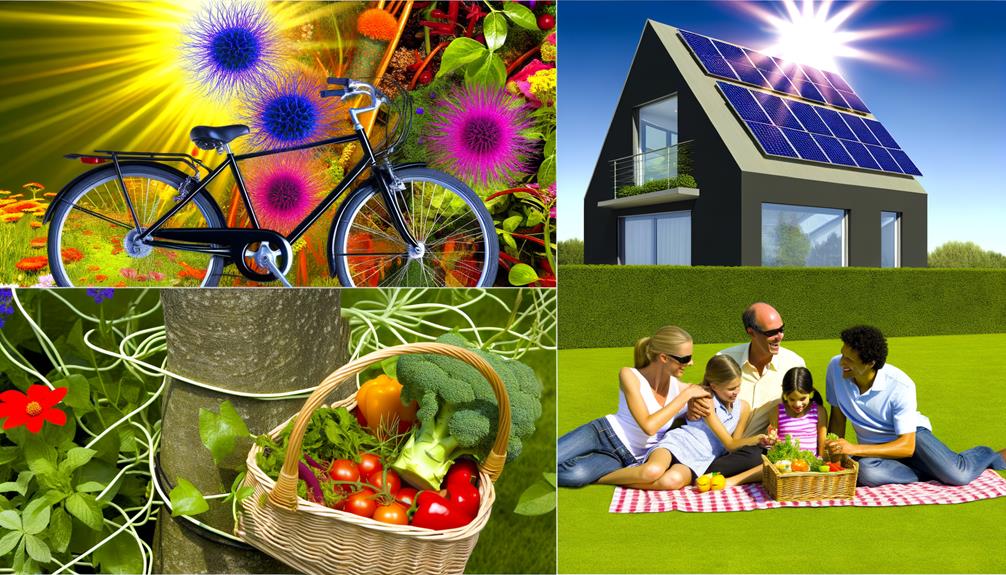As you stand at the crossroads of dietary choices, consider the path of animal-free living, a journey that promises a lighter footprint on our planet’s delicate tapestry. You’re not just opting out of a meal choice; you’re participating in a global shift that paves the way for a sustainable future. By choosing plant-based foods, you reduce your carbon emissions, conserve precious water, and stand as a guardian for animal welfare. It’s a transformative act that not only aligns with ethical values but also caters to your health, reducing risks associated with chronic diseases. The burgeoning availability of plant-based products beckons you to explore a world where innovation meets tradition, and where each bite is a statement of personal responsibility and environmental stewardship. Imagine the impact if your next meal could be an investment in our collective tomorrow—would you turn the page on old habits to uncover the full potential of a sustainable lifestyle?
Key Takeaways
- Plant-based diets have numerous environmental benefits, including reducing greenhouse gas emissions, supporting sustainable agriculture, and combating deforestation and habitat loss.
- Adopting a plant-based lifestyle can contribute to better health outcomes, such as reducing the risk of chronic diseases, supporting healthy cholesterol levels, and aiding in weight management.
- Tips for a plant-based diet include focusing on whole foods, incorporating legumes for protein, experimenting with vegan alternatives, and supplementing with essential nutrients.
- Sustainable eating habits involve minimizing food waste, supporting local producers, choosing sustainable food products, and recognizing that vegan diets already minimize the environmental impact of animal agriculture.
Environmental Benefits
Embracing a plant-based diet not only nourishes your body, but also plays a crucial role in combating climate change by significantly lowering greenhouse gas emissions. You’re making a profound decision that reverberates beyond your personal health. By choosing plant-based options, you’re advocating for sustainable agriculture, a practice that preserves our precious biodiversity and conserves natural resources.
Your commitment to plant-based living directly combats the deforestation and habitat loss driven by animal agriculture. It’s a stand against the clearing of our forests and the displacement of wildlife, safeguarding the lungs of our planet for future generations. Reducing the demand for animal products is more than an ethical choice; it’s a powerful move towards sustainable living.
Moreover, your plant-based journey contributes to minimizing food waste, as many plant-based foods have a longer shelf life compared to animal products. This shift has a ripple effect, reducing your carbon footprint and making a tangible impact on environmental preservation.
Be proud that your choice supports a healthier planet. Plant-based diets are a cornerstone of an ethical lifestyle that values stewardship over exploitation. You’re not just eating; you’re leading the charge to combat climate change and ensure a sustainable future for all.
Health Advantages
Your switch to a plant-based diet not only benefits the planet but also offers profound health advantages, significantly reducing your risk of developing chronic diseases like heart disease and type 2 diabetes. Embracing a vegan diet comes with numerous health benefits, including:
- Decreased Risk of Heart Disease
- *High fiber intake* from whole grains and legumes supports healthy cholesterol levels.
- *Antioxidant-rich fruits and vegetables* lower blood pressure and reduce inflammation.
- Weight Management
- *Low-calorie plant foods* help maintain a healthy weight without feeling deprived.
- *Healthy fats from nuts and seeds* provide satiety and aid in controlling cravings.
Incorporating a variety of colorful fruits and vegetables in your meals ensures you’re getting essential nutrients necessary for your body’s optimal functioning. A balanced diet filled with plant-based protein sources meets your nutritional needs while promoting vitality and energy.
You’ll discover that nuts and seeds aren’t just crunchy snacks but are packed with nutrients that support heart health and weight management. As you serve yourself and others, recognize that a commitment to a vegan lifestyle is a step toward a healthier future for all. It’s a compassionate choice that aligns with the ethical treatment of animals and the well-being of our planet.
Plant-Based Diet Tips
To thrive on a plant-based diet, focus on whole foods like fruits, vegetables, and whole grains, ensuring you fuel your body with a symphony of nutrients essential for vibrant health. Adopting a plant-based diet offers a tapestry of benefits for both you and the planet. It’s a compassionate choice that aligns with a deep desire to serve others, including our fellow Earth inhabitants.
Dive into the variety plant-based foods offer. Explore legumes like beans and lentils for your protein needs; they’re not only hearty but also beneficial for your heart. Tofu, tempeh, and seitan are versatile vegan alternatives that can take on any flavor you fancy, making them perfect for trying out new recipes. Remember, variety is the spice of life, and it’s crucial for getting all the necessary nutrients.
As you embrace this vegan lifestyle, be mindful of the less obvious nutrients. Supplement with vitamin B12, essential for nerve function, and consider vitamin D and Omega-3 fatty acids to keep your body at its best. Plan your meals with intention, ensuring each dish is balanced and bursting with the goodness of whole grains, healthy fats, and the rainbow of nutrients that whole, plant-based foods provide.
Sustainable Eating Habits
While you nourish your body with a variety of whole, plant-based foods, consider how adopting sustainable eating habits can further reduce your ecological footprint and promote a healthier planet. Your choices are powerful, resonating beyond your plate and into the fields of agriculture, the air we breathe, and the water we drink.
By choosing a vegan diet, you’re already minimizing the environmental impact of animal agriculture—one of the heftiest contributors to greenhouse gas emissions. Yet, there’s more you can do:
- Minimizing Food Waste
- Composting scraps
- Planning meals to use all purchased ingredients
- Supporting Local
- Buying local produce to reduce transportation emissions
- Engaging with community-supported agriculture (CSA) programs
Every action you take, from opting for local produce to conscientiously minimizing food waste, is an ethical stance against the unsustainable practices of mass farming. It’s a commitment to nourishing not only yourself but also the community and the planet.
While sustainable food products are a cornerstone, remember that true sustainability extends to all aspects of living—consciously selecting fashion, personal care items, and everyday consumables that align with your values. You’re not just serving your health; you’re serving a vision of a world where all beings and the environment thrive together.
Overcoming Common Challenges
Embarking on an animal-free lifestyle is an empowering journey, yet you may encounter hurdles such as navigating social settings or ensuring nutritional adequacy. Going vegan is a bold step towards a more compassionate and sustainable world, reducing the demand for animal products. You’re not just making a dietary choice; you’re advocating for a profound shift in societal norms.
In social situations, bring a vegan dish to share. This not only eases the pressure but also introduces others to the delicious possibilities of a plant-based lifestyle. When cravings hit, explore the abundance of vegan options that mimic familiar flavors and textures.
Here’s a quick guide to overcoming common challenges:
| Challenge | Solution | Benefit |
|---|---|---|
| Social Gatherings | Bring a Dish to Share | Encourages Inclusivity |
| Nutritional Adequacy | Educate on Plant-Based Nutrition | Ensures a Balanced Diet |
| Time Constraints | Meal Prep and Planning | Saves Time & Reduces Stress |
| Cravings | Find Vegan Alternatives | Maintains Diet Satisfaction |
Frequently Asked Questions
What Is the Vegan Philosophy?
You’re asking about vegan philosophy? It’s about plant ethics, health impacts, and environmental benefits. It’s your moral obligation to make dietary choices that ensure ethical consumption, cruelty-free practices, and contribute to agricultural sustainability and food justice.
What Is a Vagan?
A vegan’s a beacon of ethical eating, choosing plant-based proteins and meatless meals. You’ll find health benefits, nutritional balance, and reduced environmental impact. Dispelling vegan stereotypes, they opt for dairy alternatives and sustainable global food practices.
What Are Your Thoughts on the Concept of Veganism and Speciesism?
You’re pondering veganism’s ethics, considering animal rights, and weighing ecological impact. It’s about making compassionate choices, acknowledging cultural influences, and embracing the health benefits while fulfilling a moral obligation to reduce your ecological footprint.
What Is the Vegan Way of Life?
The vegan way of life combines ethical eating, cruelty-free choices, and conscious consumption for a profound environmental impact. It’s about dietary diversity, savoring global foods, and ensuring nutrient intake with alternative proteins. You’re choosing health and compassion.







